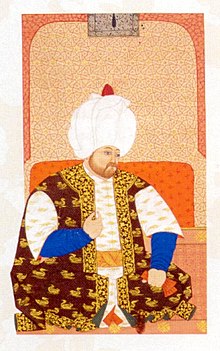Selim II
Selim II ( May 30, 1524 , † December 13, 1574 in Constantinople, now Istanbul ) was Sultan of the Ottoman Empire from 1566 until his death. Because of his addiction to alcohol he was nicknamed Sarhoş Selim , "Selim the drunkard". In addition, he was nicknamed Sarı Selim , "Selim the Blonde", because of his blond beard .
Origin and family
Selim was the third son of Süleyman the Magnificent and his favorite wife Roxelane (Hürrem, Aleksandra Lisowska). He owed his advancement to his mother. Mustafa, the son of his father Suleyman from another connection, became a rival and darling of the Janissaries . Mustafa was accused of treason and strangled. In 1545, in Konya , Selim married Nurbanu , a Venetian noblewoman named Cecilia Venier-Baffo, who was kidnapped and enslaved by pirates as a child. Later, as Valide Sultan , she de facto led the Ottoman government in the course of the so-called women's rule .
government
Selim was the first of the Ottoman sultans who did not take an active part in politics and warfare, but rather left these matters to his son-in-law, the Grand Vizier Sokollu Mehmed Pascha . He himself rarely left the Topkapı Palace , where he celebrated extravagant parties and large wine bar , which is why he is considered to be alcoholic in research . At the beginning of his reign he concluded a peace treaty with all neighboring states. The Selimiye Mosque was built on the orders of Sultan Selim II by builder Sinan in the years 1568–1575 in Edirne .
Selim initiated the conquest of Cyprus , saying it was a source of unrest and that contradicts the interests of the people of the region, in addition, Cyprus lies in the middle of Ottoman influence, and the island has been Muslim territory for more or less long periods of time since the Arab invasions and until recently that Mamluk Empire had to pay tribute. Particularly serious is the fact that Christian pirate fleets operated under the protection of the island, endangered pilgrimages to the holy sites of Islam and almost brought traffic on the trade routes between Egypt and the Ottoman heartland to a standstill. So he commissioned Lala Mustafa Pascha in 1571 to take Cyprus, which he succeeded after six months of siege. In the same year he successfully supported Stephan Báthory in his conflict with Gáspár Bekes over the election of Prince of Transylvania . He thereby emphasized the supremacy over the land, which was also claimed by the Habsburgs.
In 1572 he had the Hagia Sophia and the Al-Haram mosque in Mecca renovated. The sultan allowed the Crimean Tatars to wage a campaign against Russia in 1572 , which ended with Russia paying tribute to the Ottomans. In 1573 Tunisia was conquered. Sultan Selim II died eight years after his accession to the throne on December 15, 1574 by falling in a drunkenness. He was buried in the former baptistery of Hagia Sophia, which was rededicated as his grave. When Selim II became Sultan, the Ottoman Empire was 14,892,000 km². Eight years later, the Ottoman Empire had a slightly enlarged area of 15,162,000 km².
literature
- Ferenc Majoros, Bernd Rill: The Ottoman Empire 1300-1922. The story of a great power . Marix, Wiesbaden 2004, ISBN 3-937715-25-8 .
- Josef Matuz: The Ottoman Empire. Baseline of its history . 4th edition. Scientific Book Society, Darmstadt 2006, ISBN 3-534-20020-9 .
- Nicolae Iorga : History of the Ottoman Empire. Depicted according to the sources. 5 volumes, Verlag Perthes, Gotha 1908–1913, reprinted Frankfurt / Main 1990.
- Gabriel Effendi Noradounghian : Recueil d'actes internationaux de l'Empire Ottoman 1300-1789. Tome I. Paris, Neufchâtel 1897. Reprint: Kraus, Nendeln 1978, ISBN 3-262-00527-4 .
Web links
- Literature by and about Selim II in the catalog of the German National Library
- http://www.tuerkenbeute.de/kun/kun_bio/Selim2_de.php ( Memento from October 29, 2017 in the Internet Archive ) Badisches Landesmuseum, Karlsruhe: Selim II.
Individual evidence
- ^ Josef Matuz , The Ottoman Empire. Basics of its history , Wissenschaftliche Buchgesellschaft, Darmstadt 1985, p. 131
| predecessor | Office | successor |
|---|---|---|
| Suleyman I. |
Sultan and Caliph of the Ottoman Empire 1566–1574 |
Murad III |
| personal data | |
|---|---|
| SURNAME | Selim II |
| BRIEF DESCRIPTION | Sultan of the Ottoman Empire |
| DATE OF BIRTH | May 30, 1524 |
| DATE OF DEATH | December 13, 1574 |
| Place of death | Constantinople |

